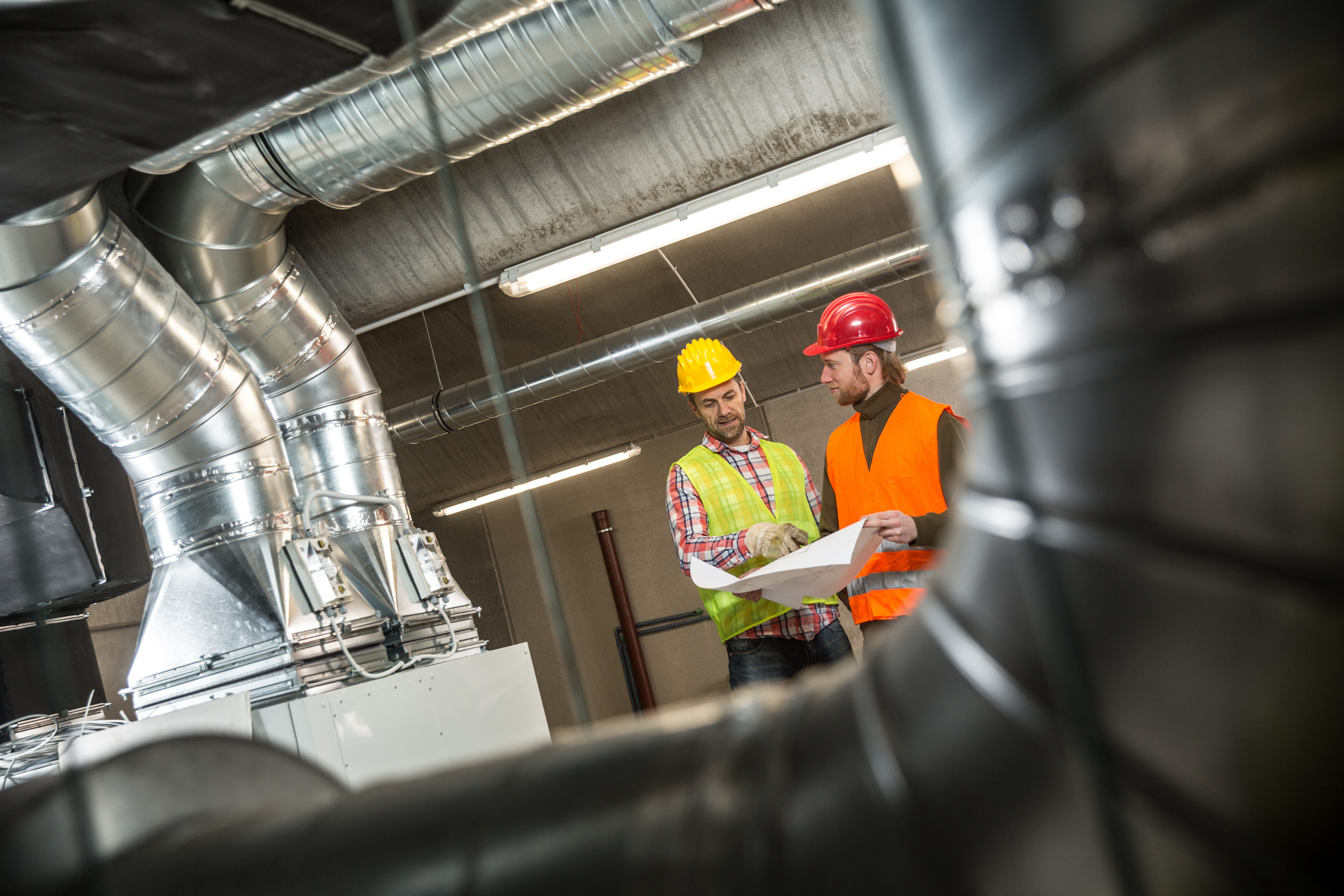Breaking Down the Commercial HVAC Construction Process
November 5, 2021

Know the steps of commercial HVAC and plumbing construction and how to evaluate a contractor providing mechanical service and construction.
Conducting commercial mechanical construction is a significant task but one that can be broken down into key stages. Commercial HVAC installation involves planning and design stages, construction and installation work, and, finally, evaluation and ongoing maintenance. Each of these stages is critical to prolong your building’s lifecycle and meet the needs of those occupying it.
The First Steps: Planning and Design
The commercial HVAC construction process entails installing new HVAC units for better air conditioning and energy efficiency for your commercial building.
Planning and designing for a new mechanical system involves looking at floor plans, occupancy rates, and generated heat load. Calculating heating, cooling, and airflow requirements and selecting the type of equipment are also needed. .png?width=756&name=Copy%20of%20Avio%20Highlighted%20Template%20(14).png)
Office buildings and most other commercial structures are also evaluated to see if custom fabrication is necessary for supports and piping systems. A quality mechanical contractor will become a part of the design team as early as possible. Engaging with the engineers and architects to review building plans, needs of the customer, and apply their construction knowledge and experience of projects to make the build go as smoothly as possible.
Construction and Installation: Project Essentials
The actual construction and installation steps for new mechanical equipment involve:
- Installing air conditioners, heat pumps, or any other needed equipment on a facility’s roof or other designated areas;
- Custom fabrication (as needed) for support structures, piping systems, and ductwork;
- Installing controls, thermostats, and/or automated systems for regulating temperature and airflow.
Commercial mechanical installation, like any commercial construction project, should involve a timetable and budget that accurately represents the tasks involved. An experienced commercial mechanical contractor can provide precise budget and time estimates for all construction and installation processes necessary to complete the job on time and on or under budget.
Evaluation: Bringing Your Commercial Mechanical Systems Online
Once built and installed, new cooling, heating, and plumbing systems must be evaluated for proper functioning and efficient operation. Evaluation typically includes:
- Testing system performance and ventilation systems by evaluating airflow, looking for leaks, and checking the pressure
- Measuring output and testing temperature changes as well as indoor air quality
- Evaluating load and capacity use, which compares energy use to how efficiently your system heats, cools, and moves air
Ongoing Maintenance and HVAC Service
Once the equipment is installed and operating well, expert HVAC technicians and service plumbers can keep everything running smoothly.
.png?width=756&name=Copy%20of%20Avio%20Highlighted%20Template%20(15).png)
United Mechanical offers a commercial HVAC maintenance program that provides ongoing preventative maintenance as well as diagnostics and repairs for HVAC equipment. Having the same commercial HVAC provider handle both installation and service needs can result in more fluid service and greater familiarity with installed units.
What to Look for in a Commercial Mechanical Construction Contractor
Selecting a commercial construction and services provider is an important choice because your building’s HVAC system ultimately affects occupants’ comfort, health, and productivity. Here are some key qualities to look for in a contractor:
1. Knowledge base and expertise
A good contractor should have knowledge of the entire mechanical construction process, with specialists in different areas, such as planning, pre-construction, BIM, plumbing, pipefitting, sheet metal installation, post-construction system evaluation, and quality control.
2. Past projects and work examples
A contractor should have a solid portfolio of work and examples of projects and buildings involving work similar to yours. Clients similar to your business should be able to recommend their service. A long list of satisfied clients is an important indicator of success.
3. Attention to planning and design
Along with general expertise, attention to planning stages indicates a contractor that wants to make sure a job is done thoroughly and correctly. Careful planning avoids unexpected delays or workarounds during installation and ensures that system design best fits a building’s needs.
Providing Exceptional Commercial HVAC Construction
Commercial HVAC construction is worth doing right the first time. That’s why working with an experienced contractor like United Mechanical is always recommended.
Our experts can design, plan, install, and service new HVAC and plumbing equipment for your facility. To find out more about how we can work with your business, call us today for a quote or have any questions answered.

